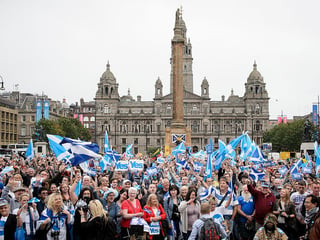Scotland's private sector output tanks as lockdown hits businesses hard - RBS


The latest Royal Bank of Scotland PMI – a measure of combined manufacturing and service sector output – fell to 33.3 in January, down from 47.3 in December, pointing to a rapid drop in private sector output. Any reading below the 50 no-change denotes contraction.
Excluding the March to May period of last year, the latest reading was the lowest since the PMI series began in 1998.
Advertisement
Hide AdAdvertisement
Hide AdNew work fell at a similarly sharp pace, with the decline also the most marked for eight months. As a result, companies made further cuts to their headcounts.
Despite the challenging conditions, sentiment improved during January, with business confidence the highest since early-2014 on the back of the ongoing vaccine rollout, as well as hopes of looser restrictions.
Malcolm Buchanan, chair, Scotland board at Royal Bank of Scotland, said: “Stricter lockdown measures took a toll on the Scottish private sector during January, with the downturn worsening amid steep drops in both activity and new business.
“The falls remained slower than at the height of the first lockdown last spring, perhaps reflective of companies adapting to restrictions, but were still severe.
“Positive news again came from business confidence, which was the strongest since April 2014 amid hopes of an economic recovery once restrictions are lifted.
“Conditions will remain very challenging in the meantime, but there is a light at the end of the tunnel for Scotland’s economy as the vaccine rollout progresses and measures are loosened.”
The latest data highlighted another upturn in cost burdens facing Scottish businesses, extending the current sequence of higher input prices to eight months. According to respondents, the rise was driven by greater raw material, fuel and transport costs, as well as higher wage bills and additional coronavirus-related expenditure.
Although still sharp, the rate of inflation eased from December. Scotland registered the second-slowest increase in costs across the 12 monitored UK areas, ahead of London.
Advertisement
Hide AdAdvertisement
Hide AdIn response to greater input costs, private sector firms increased their average charges for the third straight month in January.
